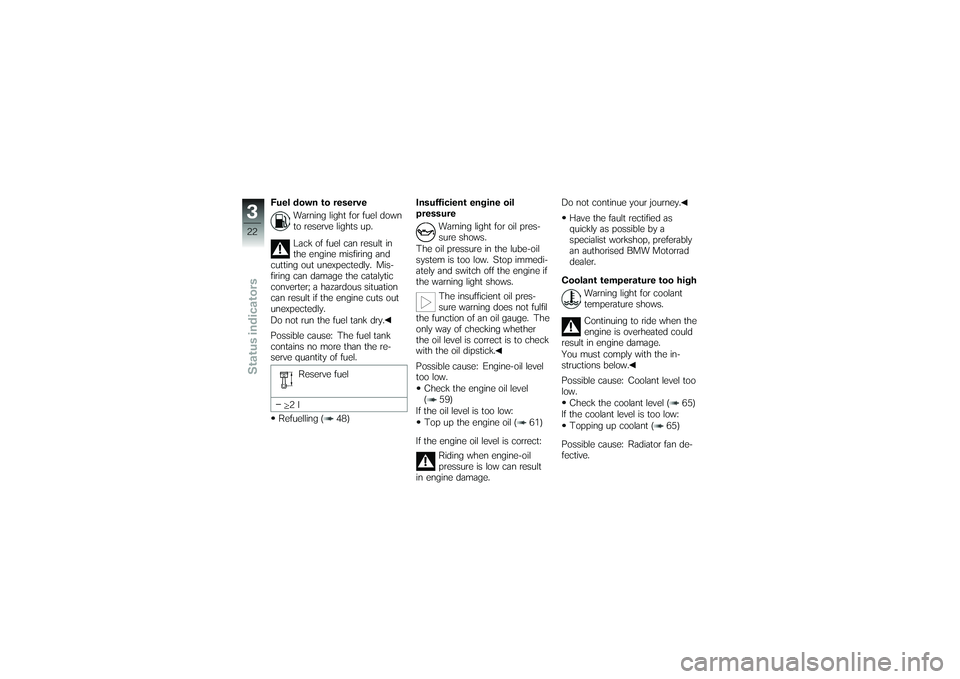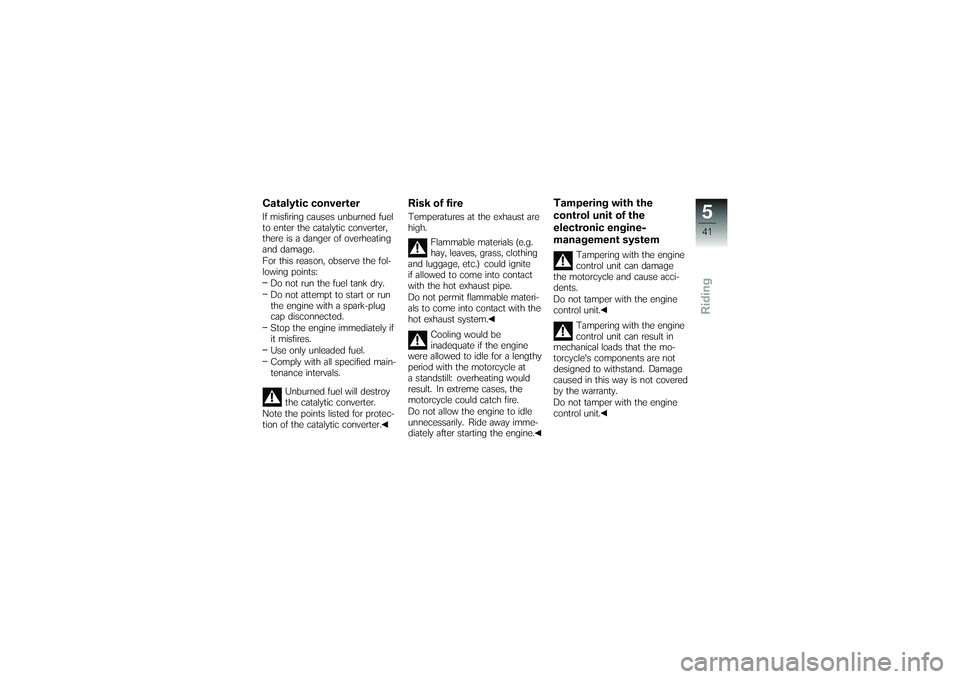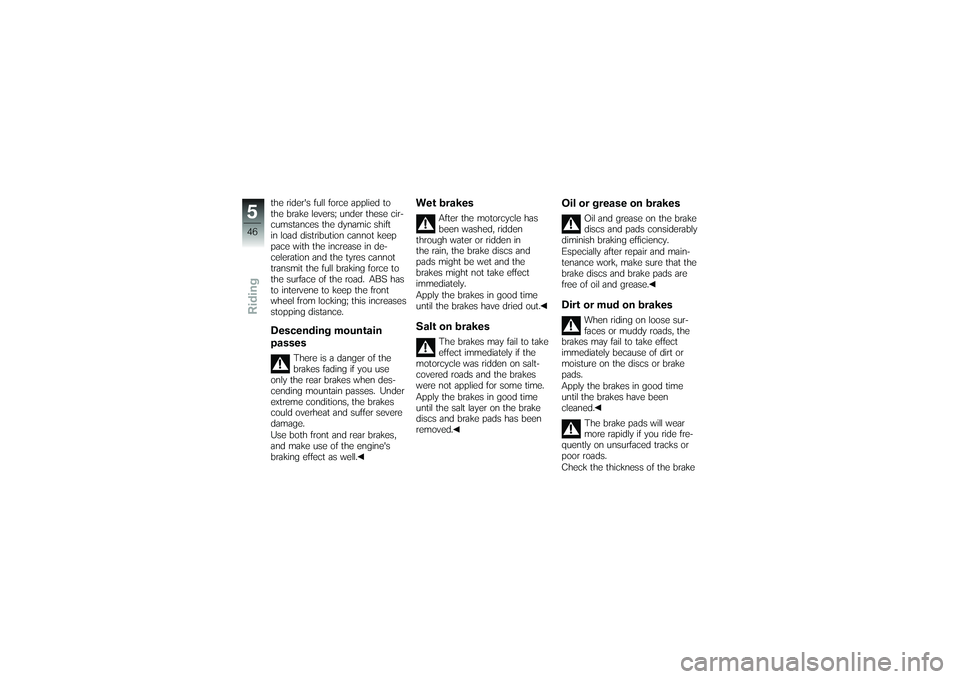Page 24 of 126

Fuel down to reserveWarning light for fuel down
to reserve lights up.
Lack of fuel can result in
the engine misfiring and
cutting out unexpectedly. Mis-
firing can damage the catalytic
converter; a hazardous situation
can result if the engine cuts out
unexpectedly.
Do not run the fuel tank dry.
Possible cause: The fuel tank
contains no more than the re-
serve quantity of fuel.
Reserve fuel
2l
Refuelling ( 48) Insufficient engine oil
pressure
Warning light for oil pres-
sure shows.
The oil pressure in the lube-oil
system is too low. Stop immedi-
ately and switch off the engine if
the warning light shows.
The insufficient oil pres-
sure warning does not fulfil
the function of an oil gauge. The
only way of checking whether
the oil level is correct is to check
with the oil dipstick.
Possible cause: Engine-oil level
too low.
Check the engine oil level
( 59)
If the oil level is too low: Top up the engine oil ( 61)
If the engine oil level is correct: Riding when engine-oil
pressure is low can result
in engine damage. Do not continue your journey.
Have the fault rectified as
quickly as possible by a
specialist workshop, preferably
an authorised BMW Motorrad
dealer.
Coolant temperature too high Warning light for coolant
temperature shows.
Continuing to ride when the
engine is overheated could
result in engine damage.
You must comply with the in-
structions below.
Possible cause: Coolant level too
low.
Check the coolant level ( 65)
If the coolant level is too low:
Topping up coolant ( 65)
Possible cause: Radiator fan de-
fective.
322zStatus indicators
Page 43 of 126

Catalytic converterIf misfiring causes unburned fuel
to enter the catalytic converter,
there is a danger of overheating
and damage.
For this reason, observe the fol-
lowing points:Do not run the fuel tank dry.
Do not attempt to start or run
the engine with a spark-plug
cap disconnected.
Stop the engine immediately if
it misfires.
Use only unleaded fuel.
Comply with all specified main-
tenance intervals.
Unburned fuel will destroy
the catalytic converter.
Note the points listed for protec-
tion of the catalytic converter.
Risk of fireTemperatures at the exhaust are
high.
Flammable materials (e.g.
hay, leaves, grass, clothing
and luggage, etc.) could ignite
if allowed to come into contact
with the hot exhaust pipe.
Do not permit flammable materi-
als to come into contact with the
hot exhaust system.
Cooling would be
inadequate if the engine
were allowed to idle for a lengthy
period with the motorcycle at
a standstill: overheating would
result. In extreme cases, the
motorcycle could catch fire.
Do not allow the engine to idle
unnecessarily. Ride away imme-
diately after starting the engine.
Tampering with the
control unit of the
electronic engine-
management system
Tampering with the engine
control unit can damage
the motorcycle and cause acci-
dents.
Do not tamper with the engine
control unit.
Tampering with the engine
control unit can result in
mechanical loads that the mo-
torcycle's components are not
designed to withstand. Damage
caused in this way is not covered
by the warranty.
Do not tamper with the engine
control unit.
541zRiding
Page 48 of 126

the rider's full force applied to
the brake levers; under these cir-
cumstances the dynamic shift
in load distribution cannot keep
pace with the increase in de-
celeration and the tyres cannot
transmit the full braking force to
the surface of the road. ABS has
to intervene to keep the front
wheel from locking; this increases
stopping distance.Descending mountain
passes
There is a danger of the
brakes fading if you use
only the rear brakes when des-
cending mountain passes. Under
extreme conditions, the brakes
could overheat and suffer severe
damage.
Use both front and rear brakes,
and make use of the engine's
braking effect as well.
Wet brakes
After the motorcycle has
been washed, ridden
through water or ridden in
the rain, the brake discs and
pads might be wet and the
brakes might not take effect
immediately.
Apply the brakes in good time
until the brakes have dried out.
Salt on brakes
The brakes may fail to take
effect immediately if the
motorcycle was ridden on salt-
covered roads and the brakes
were not applied for some time.
Apply the brakes in good time
until the salt layer on the brake
discs and brake pads has been
removed.
Oil or grease on brakes
Oil and grease on the brake
discs and pads considerably
diminish braking efficiency.
Especially after repair and main-
tenance work, make sure that the
brake discs and brake pads are
free of oil and grease.
Dirt or mud on brakes
When riding on loose sur-
faces or muddy roads, the
brakes may fail to take effect
immediately because of dirt or
moisture on the discs or brake
pads.
Apply the brakes in good time
until the brakes have been
cleaned.
The brake pads will wear
more rapidly if you ride fre-
quently on unsurfaced tracks or
poor roads.
Check the thickness of the brake
546zRiding